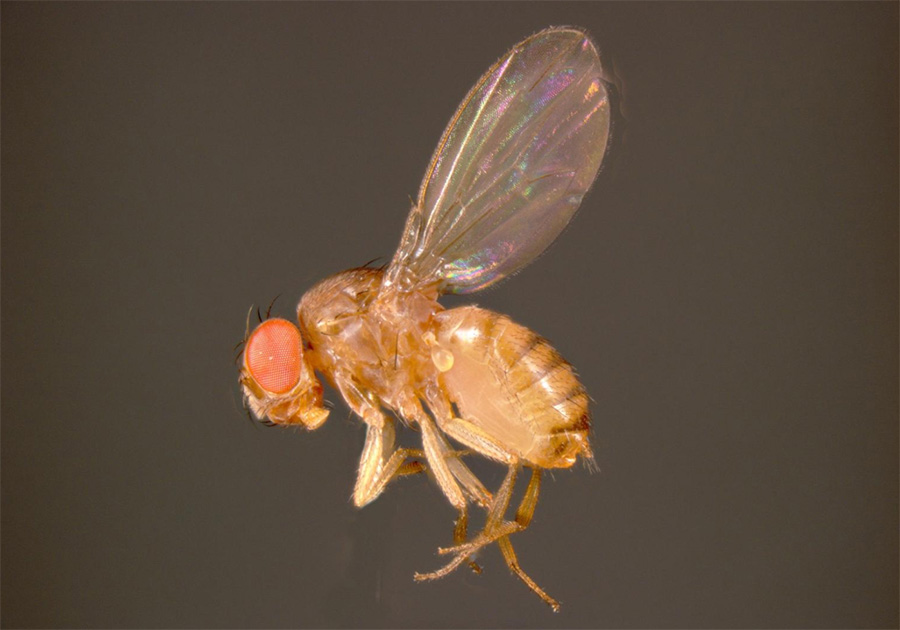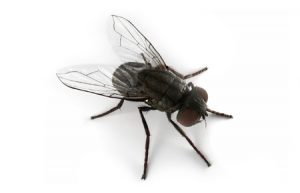
(Attribution: Pest and Diseases Image Library, Bugwood.org)


Flies come in different sizes and varieties, but they have two things in common: they feed and breed in disgusting places and they spread germs. The most common large fly to find indoors is the house fly while the most common small fly to find indoors is the fruit fly. While there are many types of flies which indicate different problems, we specialize in all types of identification and fly removal.

House flies are typically grey with dark stripes running down their backs. Their size can vary, but in general, the house fly is about ¼ of an inch in length. They prefer to lay their eggs in a warm, moist medium where their larvae (maggots) can flourish. This could be in your trash can or outside near grass clippings or garden waste.
The most common variants of blow flies are the green bottle and blue bottle flies, easily identified by their blue or green metallic sheen. Blow flies typically lay their eggs in carrion flesh or dung, where their larvae can flourish. This means that if you have numerous blow flies in your home or business, you likely have a dead animal somewhere nearby.
Fruit flies are very small and breed so quickly that scientists use them for experimentation and study purposes. There are two main types of fruit fly that we deal with: the red-eyed and the dark-eyed fruit fly. The red-eyed variety of fruit fly is known for its love of being near anything associated with fermentation, including liquor bottles, beer taps and overripe fruit. The dark-eyed fruit fly, one of the more difficult pests to contain in the food service industry, prefers to breed in decomposing organic matter such as worn grout in a tile floor, a dirty drain or a wet mop.

The house fly, and other types of flies, are mostly known as nuisance pests, but they are potentially dangerous due to their ability to spread diseases like food poisoning and dysentery, an intestinal inflammation that can lead to mild or severe stomach cramps and severe diarrhea. These filth flies often feed and lay eggs on garbage, manure or dead animals before flying over and landing on your food. To make matters more disgusting, they regurgitate their stomach contents onto food before eating it. Needless to say, you don’t want them in your home.

Noticing a few flies here and there in your building does not necessarily mean there is an infestation, but it could indicate a need to take preventative care. Sanitation and exclusion are the keys to controlling flies in general: if there is no warm, moist medium, there will be no place for them to breed. Flies are known to breed quickly and prolifically, especially in warm or hot weather. Exclusion is also an important factor. House flies, for example, rarely breed indoors. Preventing their entry will prevent problems associated with them. Many control measures seem so simplistic, they are often ignored, including:
Of course, you can do all these things and flies may still get in. For the most effective control, call Braman and we will help design a successful house fly management program for your residential or commercial property.

As always, sanitation and exclusion are keys to preventing or eliminating a fly infestation—generally sanitation in situations with small flies and exclusion in situations with large flies. Even still, professional help may be needed, especially in the case of fruit flies. Braman has found that, while fly removal methods like sprays and fogging will kill plenty of fruit flies, insecticides alone are not the way to get rid of them completely. The best way to remove fruit flies is bioremediation. Braman uses a foam product with natural scum and odor-eating microbes. Once we have applied Invade®, it expands, coating the breeding surface and gradually digesting the decaying organic matter on which they breed. Reach out to Braman today, we can help you eliminate these pests for good.

Tell us about your pest problem. We can provide a free estimate over the phone.
Call Braman 24/7 at 800-338-6757

(Attribution: Pest and Diseases Image Library, Bugwood.org)